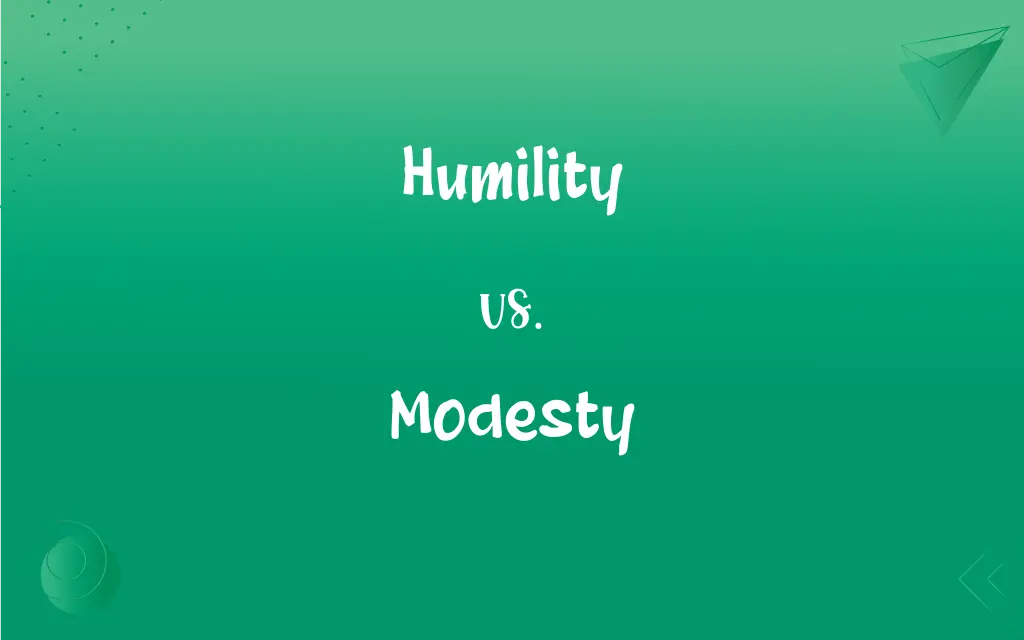Humility vs. Modesty: What's the Difference?
Edited by Aimie Carlson || By Harlon Moss || Published on January 30, 2024
Humility is the quality of being humble and not considering oneself superior, while modesty is the act of downplaying one's abilities or achievements.

Key Differences
Humility involves recognizing one’s own limitations and the value of others, often accompanied by a lack of ego or arrogance. Modesty, however, typically refers to being unassuming about one’s abilities, achievements, or status, often in how one presents oneself.
A humble person acknowledges their flaws and is open to learning and growth, often focusing on others rather than themselves. In contrast, a modest individual might downplay their successes or talents, preferring not to draw attention to themselves.
Humility is often seen as a moral or spiritual virtue, reflecting a deeper understanding of one's place in the world. Modesty, on the other hand, is more about social behavior, relating to how one displays accomplishments or speaks about oneself.
In humility, there’s an element of self-awareness and respect for others' perspectives and abilities. Modesty, while also a form of self-awareness, is more specifically about not boasting or being showy about one’s achievements.
Humility can be a guiding principle in one’s life, affecting various decisions and interactions. Modesty, however, is generally more specific to situations involving self-presentation and recognition.
ADVERTISEMENT
Comparison Chart
Focus
Recognizing one’s limitations and valuing others
Downplaying one’s abilities or achievements
Associated With
Moral virtue, self-awareness
Social behavior, self-presentation
Expression
In attitude and behavior towards others
In how one talks about or displays achievements
Root
Self-reflection and understanding
Avoidance of boastfulness or showiness
Scope
Broad, affecting overall character
Specific to certain situations
ADVERTISEMENT
Humility and Modesty Definitions
Humility
The trait of being humble and not asserting superiority over others.
Despite her vast knowledge, she approached discussions with humility.
Modesty
Downplaying one’s own achievements or talents.
Out of modesty, she rarely spoke of her awards.
Humility
Recognizing and accepting one’s limitations and the value of others.
His humility allowed him to learn from his mistakes.
Modesty
The act of not boasting about one's skills or achievements.
She showed modesty by attributing her success to luck.
Humility
The quality of having a modest view of one's importance.
His humility was evident in how he credited his team for the success.
Modesty
Being unassuming in the estimation of one's abilities.
His modesty prevented him from highlighting his contributions.
Humility
A lack of ego or arrogance, with a focus on others.
Her humility shone through when she praised her competitor.
Modesty
Avoiding excess in self-presentation and behavior.
She chose a simple outfit, reflecting her sense of modesty.
Humility
A moral virtue that involves a deep understanding of one’s place in the world.
He showed great humility by volunteering anonymously.
Modesty
A form of self-awareness related to how one displays accomplishments.
Despite his expertise, he maintained a sense of modesty in discussions.
Humility
The quality or condition of being humble.
Modesty
The state or quality of being moderate in the estimation of one's own abilities, accomplishments, or value.
Humility
The characteristic of being humble; humbleness in character and behavior.
Modesty
Reserve or propriety in speech, dress, or behavior
Modesty prevented her from wearing that dress.
Humility
The state or quality of being humble; freedom from pride and arrogance; lowliness of mind; a modest estimate of one's own worth; a sense of one's own unworthiness through imperfection and sinfulness; self-abasement; humbleness.
Serving the Lord with all humility of mind.
Modesty
The state of being unostentatious or moderate in size, quantity, or range
The modesty of the room's furnishings.
Humility
An act of submission or courtesy.
With these humilities they satisfied the young king.
Modesty
The quality of being modest; having a limited and not overly high opinion of oneself and one's abilities.
Humility
A disposition to be humble; a lack of false pride;
Not everyone regards humility as a virtue
Modesty
Moderate behaviour; reserve.
Humility
A humble feeling;
He was filled with humility at the sight of the Pope
Modesty
(specifically) Pudency, avoidance of sexual explicitness.
Modesty
The quality or state of being modest; that lowly temper which accompanies a moderate estimate of one's own worth and importance; absence of self-assertion, arrogance, and presumption; humility respecting one's own merit.
Modesty
Natural delicacy or shame regarding personal charms and the sexual relation; purity of thought and manners; due regard for propriety in speech or action.
Her blush is guiltiness, not modesty.
Modesty
Freedom from vanity or conceit
Modesty
Formality and propriety of manner
FAQs
What is humility?
Recognizing one's limitations and valuing others, without arrogance.
Does humility involve self-deprecation?
Not necessarily; it’s more about a realistic and respectful understanding of oneself.
Is modesty only related to achievements?
Mostly, it pertains to how one presents their abilities and successes.
Can modesty be false?
Yes, sometimes modesty can be affected or insincere.
How is modesty different from humility?
Modesty is specifically about downplaying one’s abilities or achievements.
Can someone be humble but not modest?
Yes, one can acknowledge their strengths humbly without necessarily downplaying them.
How is modesty viewed in professional settings?
Often positively, but excessive modesty might hinder recognition of one’s contributions.
How do you practice humility?
By acknowledging your flaws, being open to learning, and valuing others.
Can modesty be a weakness?
If it leads to underestimating oneself or not accepting due credit, it can be seen as a weakness.
Is modesty a form of politeness?
In many cultures, modesty is indeed seen as a polite and respectful manner.
How does humility influence personal growth?
It encourages openness to learning and valuing others’ contributions.
Does humility affect leadership?
Yes, humble leaders are often more empathetic and effective.
Why do people value modesty?
Because it reflects a lack of arrogance and a considerate personality.
Does humility mean having low self-esteem?
No, it's compatible with healthy self-esteem but without egoism.
What's the difference between modesty and humility in communication?
Modesty often relates to how one speaks of themselves, while humility is broader in scope.
Can someone be too humble?
Excessive humility might be seen as a lack of confidence or assertiveness.
Are humility and modesty mutually exclusive?
No, they can coexist as complementary traits in a person.
Is humility a cultural trait?
While influenced by culture, humility is a personal virtue that varies among individuals.
Can humility be learned?
Yes, through self-reflection and understanding the value of others.
Is modesty important in social interactions?
Generally, it's appreciated as it avoids boastfulness.
About Author
Written by
Harlon MossHarlon is a seasoned quality moderator and accomplished content writer for Difference Wiki. An alumnus of the prestigious University of California, he earned his degree in Computer Science. Leveraging his academic background, Harlon brings a meticulous and informed perspective to his work, ensuring content accuracy and excellence.
Edited by
Aimie CarlsonAimie Carlson, holding a master's degree in English literature, is a fervent English language enthusiast. She lends her writing talents to Difference Wiki, a prominent website that specializes in comparisons, offering readers insightful analyses that both captivate and inform.































































